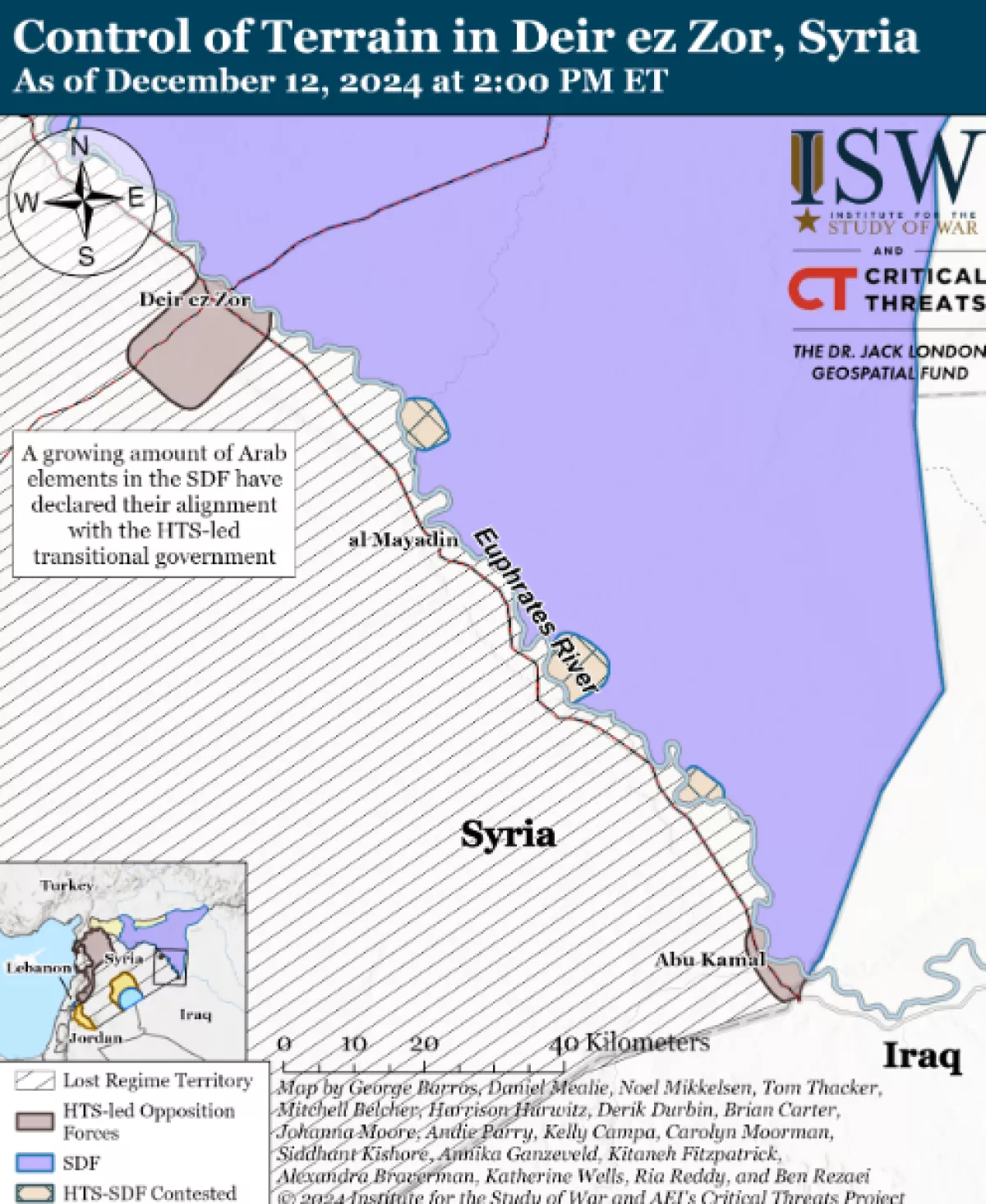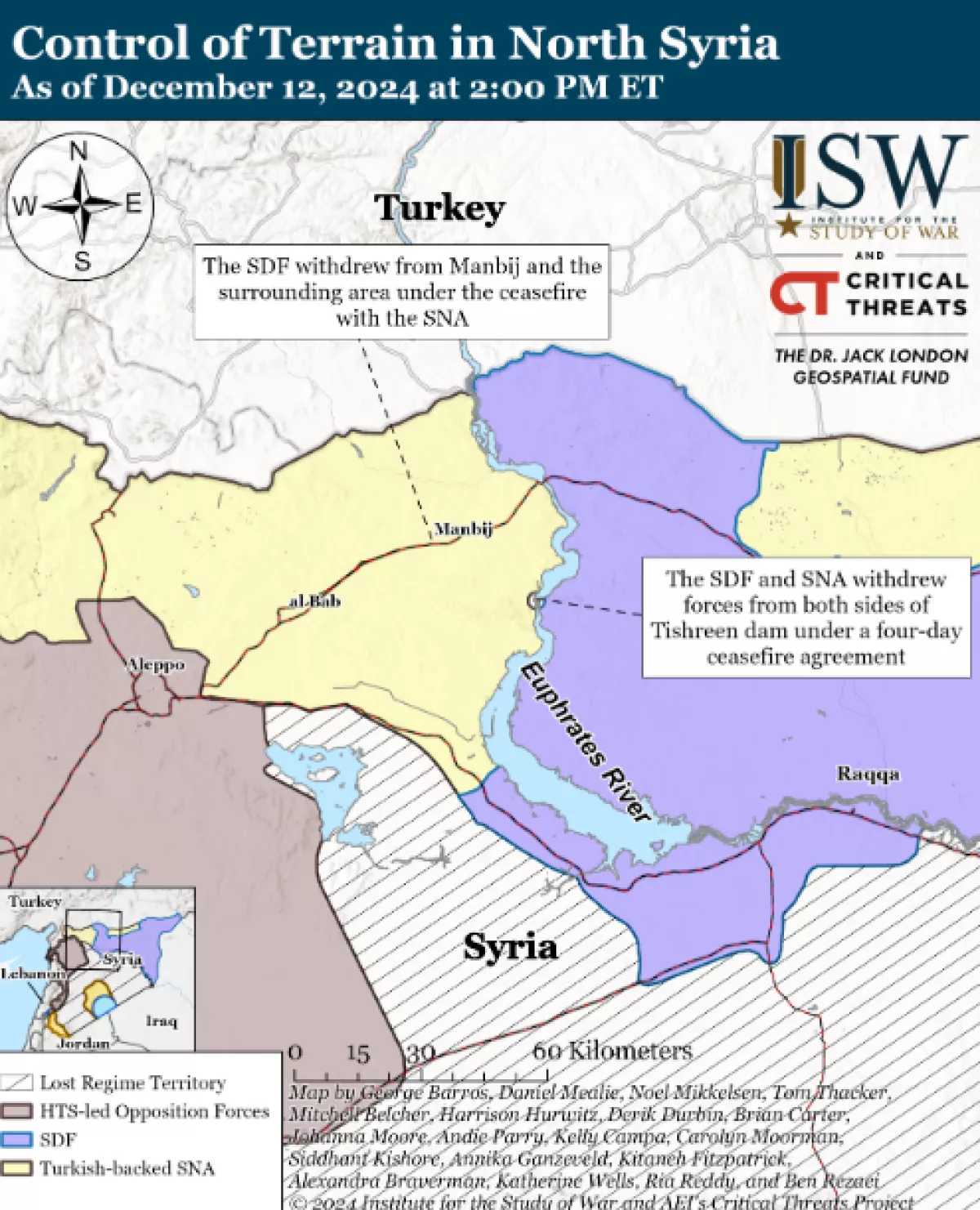ISW: SDF faces unrest in Raqqa over governance, reconstruction PHOTO/VIDEO
The US-backed Kurdish Syrian Democratic Forces (SDF) are grappling with significant internal divisions and external challenges, with recent events highlighting mounting tensions in the region.
On December 12, unrest erupted in Raqqa as local protests intensified against the SDF, Caliber.Az reports, citing ISW.
Demonstrators demanded the city transition to the governance of Hayat Tahrir al-Sham (HTS), citing longstanding grievances including inadequate reconstruction in Arab-majority areas, alleged abuses by SDF personnel, and a lack of representative Arab leadership within the SDF structure.
🔴Rakka'da yerel halkın protestolarına YPG / PKK'lı teröristlerin ateşle karşılık vermesi sonucu ölüler olduğu bildiriliyor. pic.twitter.com/QQ77beHHmI
— Defence Turk (@Defence_Turk) December 12, 2024
Footage from Raqqa showed SDF forces attempting to suppress the protests, further fuelling discontent. Meanwhile, the SDF has been hit by a wave of defections, exacerbating its internal fractures. The head of the al-Kasra Military Council, a key SDF affiliate, recently defected, accusing the group of committing "violations" against civilians in Deir ez-Zor and Raqqa.
According to reports, approximately 220 members of the Deir ez-Zor Military Council abandoned the SDF within the past 48 hours, underscoring growing Arab dissatisfaction within the predominantly Kurdish-led coalition.
🔴Haseke'de yerel halkın protestolarını YPG / PKK'lı teröristler ateş açarak dağıtmaya çalışıyor. Suriye devriminin bayrağını açan yerel halk tüm kurumlardan YPG / PKK'lı teröristlerin çıkarılmasını talep ediyor. pic.twitter.com/IxFiq9hSRy
— Defence Turk (@Defence_Turk) December 12, 2024
In a parallel development, the Turkish-backed Syrian National Army (SNA) and the SDF reached a temporary ceasefire in Manbij, northern Syria. The agreement, effective from December 12 to 16, aims to facilitate humanitarian aid delivery and establish security arrangements. As part of the deal, the SNA will hand over control of the Sultan Suleiman Tomb and nearby strategic positions to the SDF. In return, SDF forces and their families will withdraw from Manbij and surrounding rural areas.

The agreement also designates the Tishreen Dam as a demilitarized zone, ensuring the uninterrupted operation of its power plant, a critical infrastructure for the region. SDF Commander Mazloum Abdi confirmed on December 8 that his forces had withdrawn from Manbij following the settlement, marking a significant concession in the contested territory. The ceasefire follows the SNA's seizure of Manbij on December 8, underscoring the volatile nature of territorial control in northern Syria.

Amid the escalating tensions, diplomatic moves suggest a shifting regional landscape. On 12 December, the HTS-led transitional government expressed gratitude to several nations, including Bahrain, Egypt, Iraq, Italy, Jordan, Oman, and Saudi Arabia, for resuming their diplomatic missions in Damascus. The statement also confirmed plans by Qatar and Türkiye to reopen their embassies in Syria.

In a further sign of evolving dynamics, HTS leader Abu Mohammed al-Jolani and transitional caretaker Prime Minister Mohammad al-Bashir held separate meetings with senior Turkish and Qatari officials in Damascus. The talks, attended by Türkiye’s foreign minister, intelligence chief, and Qatar’s State Security Agency head, appear aimed at bolstering the transitional government’s standing. Although the HTS-led administration has not received formal recognition from any state, these engagements underscore its aspirations to position itself as Syria’s legitimate governing authority.
The SDF’s challenges reflect deeper fault lines within the multi-ethnic coalition, particularly regarding its relations with Arab communities in Syria. The growing discontent among Arab members could further weaken the group, undermining its role as a key US-backed force in the fight against extremist groups.
Simultaneously, the ceasefire in Manbij and renewed diplomatic activity indicate shifting alliances and priorities among regional powers. As Türkiye and Qatar move to restore diplomatic ties with Damascus, their involvement signals a potential recalibration of strategies in Syria’s complex political and military landscape.
However, the HTS-led transitional government’s legitimacy remains uncertain, with its bid for broader recognition facing significant international hurdles.
This evolving situation highlights the fragile balance of power in Syria, where local grievances, regional rivalries, and international interests intersect in a precarious and ever-changing conflict.
By Aghakazim Guliyev








